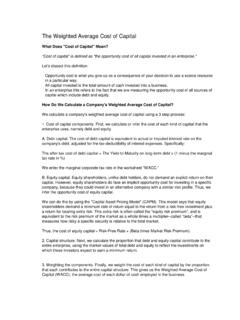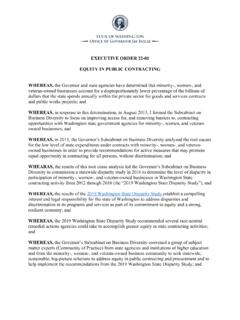Transcription of 2022 Global Private Equity Outlook - dechert.com
1 2022 Global Private Equity Outlook23 ContentsIntroduction: Total eclipse 4 Deal environment: Challenges, processes and auctions 8 Spotlight on APAC 14 Fund trends 18 Private credit 22 Spotlight on North America 24 SPAC odyssey 26 Buy and build 30 Carve-outs 32 Spotlight on EMEA 34 Exits 36 ESG 38 Conclusion 42 Methodology In the second and third quarters of 2021, Mergermarket, on behalf of Dechert LLP, surveyed 100 senior-level executives within Private Equity (PE) firms based in North America (45%), EMEA (35%), and Asia-Pacific (20%). In order to qualify for inclusion, the firms all needed to have US$500m or more in assets under management and respondents could not be first-time fund managers. The survey included a combination of qualitative and quantitative questions, and all interviews were conducted over the telephone by appointment. Results were analyzed and collated by Mergermarket, and all responses are anonymized and presented in aggregate.
2 4 Introduction: Total eclipseThe Global Private Equity (PE) industry is scorching hot. Pent-up demand for deals was unleashed in H2 2020 following a brief hiatus as the COVID-19 pandemic sent economies all over the world into lockdown. As we head towards 2022, there is little sign of this momentum letting doesn t matter on what front the industry s success is measured; the numbers speak for themselves. There were 4,605 buyouts globally in Q1-Q3 2021, already beating the annual record for Global PE volume. The rebound is also stark in value terms, with the industry on course to breeze past previous records. The US$ worth of deals recorded between January and September 2021 has already eclipsed every prior full-year total stretching back to 2015. In other words, annual PE deal value looks set to more than double year-on-year. The previous record of US$ , set in 2007 immediately before the financial crisis put an end to the credit boom of that period, is already activity has also seen the return of mega club deals.
3 One such example in June saw PE giants Blackstone, The Carlyle Group and Hellman & Friedman join forces to acquire factors are driving this robust activity. Historic levels of monetary and fiscal stimulus have been deployed to reflate economies and mitigate the disruptive impacts of the pandemic, sending public Equity and Private capital market prices soaring in the OF Global BUYOUT DEALS, 2016 Q3 2021 VALUE OF Global BUYOUT DEALS, 2016 Q3 2021Q1Q2Q3Q401,0002,0003,0004,0005,00020 2120202019201820172016 Number of deals7228467878367939539179619421,017966 1,0129049879311,0019999156871,2359591,42 59091,5271,653Q1Q2Q3Q402004006008001,000 1,200202120202019201820172016 Value (US$bn)$ $ $ $ $ $ $ $ $ $ $ $ $ $ $ $ $ $ $ $ $ $ $ is also figuring largely in deal flow, inflating valuations. Whether pure tech assets or businesses in industries that are undergoing a secular digital transformation, technology as a theme is driving demand and pushing multiples higher in what is an already extremely high-price environment.
4 Bargains are few and far record-breakers Like dealmaking, fundraising has been similarly bountiful. In the first nine months of 2021, US$630bn was collected by Private Equity firms, according to Preqin. Based on the current run rate, the industry could top previous records this year, surpassing US$ Mega funds in particular are making their presence known. Blue-chip managers have been a major beneficiary of investor demand, in many cases raising their largest vehicles to Hellman & Friedman Capital Partners X, which successfully closed on US$ in July, or Carlyle Fund XI, which, with a target of US$27bn, will become the largest PE fund ever raised if that figure is reached. Absent yield in the forever-depressed rate environment and motivated by the denominator effect, investors in search of returns continue to place capital with PE fund managers. Investors understand the transformation that Private businesses must go through to succeed going forward, and that PE s active stewardship of assets is uniquely positioned to benefit from this pressure on companies to redevelop their business models and digital investor demand, however, hardly guarantees that everything will be smooth sailing.
5 Vaccine rollouts have delivered early results but are decelerating sharply. In some markets, including the , infection rates have had a fourth wave and continue to threaten economic has adapted well to these new realities, conducting due diligence remotely and in many cases ramping up the number of potential target companies screened, as investment teams and committees have more time to focus on deal flow. As the industry navigates its most active period ever, perhaps the biggest challenge is how to compete effectively when putting its dry powder to the ongoing flight to quality, GPs will have to bid high and early to win auctions. The winners in this environment will create opportunities for themselves by drawing upon their existing relationships, from investment banks and legal advisors to corporate partners and sector networks, and even competing fund managers. Being heavily armed with capital is a major boon for the Global PE industry. But you can have too much of a good thing.
6 Looking forward to 2022, COVID-19-induced supply chain disruptions and emergent inflationary trends will also need to be considered. Cooler and more creative heads will Global Private Equity (PE) industry is scorching hot. Pent-up demand for deals was unleashed in H2 findingsTo stay ahead of the curve, 80% of APAC firms are locking in a good deal early, while 74% of EMEA firms are creatively sourcing deals. 67% of North American firms are investing in structured Equity transactions, including minority half (45%) of respondents say they have increased their use of Private credit financing in buyouts over the last three years, a noticeable jump from our previous annual PE report, when 35% of respondents reported the same. 60% of North American respondents and 49% of EMEA respondents expect a significant increase in LP scrutiny of ESG issues and reporting in deals over the next three years. Just 20% of APAC respondents say the of respondents this year flagged the amount of dry powder and ability to put capital to work as one of the biggest challenges facing the industry.
7 41% of North American respondents expect market conditions for PE exits over the coming 12 months to be very favorable, compared with just 29% of EMEA respondents and 10% of APAC respondents who say the of North American respondents expect the number of carve-outs targeted by their firm to increase over the next 12-18 months, a similar result when compared to our survey last of respondents single out climate change as the single most important ESG consideration taken into account when contemplating investing, with the second most selected consideration being sustainability (14%).78 Deal environment: Challenges, processes and auctionsFew GPs will complain about having access to too much money. But extrapolate that out to the PE industry writ large, and mountainous stores of dry powder pose a problem. It naturally leads to stronger competition and higher entry prices, which can make achieving promised returns more challenging if multiples don t continue to rise during the hold s a familiar story.
8 The industry has battled with its own success for a number of years already and, like so many other trends, the pandemic has shifted things up a gear. Investor demand for PE is at an all-time high and money is pouring into fund managers coffers, increasing demand for deals. It follows that more than one-third (35%) of respondents this year flagged the amount of dry powder and ability to put capital to work as one of the biggest challenges facing the industry. If you re in an auction right now, it s extremely competitive. You almost have to preempt it in order to win, says Markus Bolsinger, co-head of Dechert s PE practice. You have to pay at the very top end, and leaning on your existing relationships is becoming increasingly important. A third (33%) of respondents also point to challenging region-specific economic and political factors, including myriad macro risks at play in the current market. Uncertainty around the sustainability of current growth rates is likely to persist, especially as COVID-19 infection rates continue to wax and wane.
9 Over the past nine months, inflation has also been a major concern for If you re in an auction right now, it s extremely competitive. You almost have to preempt it in order to win. Markus Bolsinger, Dechert LLP 9additional limitations to carried interest on that agenda, there have also been calls to raise the corporate tax rate (with the current proposal increasing the current 21% rate to ). While taxes alone do not tend to meaningfully affect appetite for deals, any rise could make M&A more expensive on a price-to-earnings China, a recent crackdown on the tech and education sectors wiped billions of dollars of value off the Shanghai and Shenzhen stock exchanges. While this intervention may create buying opportunities, the measures have been profound, including a ban on profit-making and capital raising by Private tutoring businesses. This has the potential to create a pullback in Chinese PE deal value in the near term as market sentiment view from EuropeEurope presents its own obstacles.
10 A broad aversion to foreign investment in sensitive sectors a concern that has been heightened by the pandemic is being felt in PE circles. For example, the UK s stock market has been singled out as a prime source of attractively priced assets since Brexit and its impact on sterling. However, politicians have voiced concerns over take-privates, namely that the WHAT DO YOU SEE AS THE BIGGEST CHALLENGES CURRENTLY FACING THE Private Equity INDUSTRY? (SELECT TOP TWO AND RANK THEM 1-2, WHERE 1 IS THE BIGGEST CHALLENGE)HAVE YOU SEEN AN INCREASE IN THE USE OF MAC (MATERIAL ADVERSE CHANGE) OR OTHER BUYER TERMINATION CLAUSES? (YES ONLY)--North AmericaEMEAAsia-Pacific50%54%73%investor s across asset classes. Within PE, GPs are likely to avoid investments with fixed, bond-like characteristics such as real estate leases, which are especially prone to the effects of inflation. Big secular trends such as technology and healthcare that promise long-term growth and protected earnings margins will be in high demand amid rising prices and perspectiveOn the political side, in the the Biden administration is working on an update to the tax code that could hit PE especially hard.







